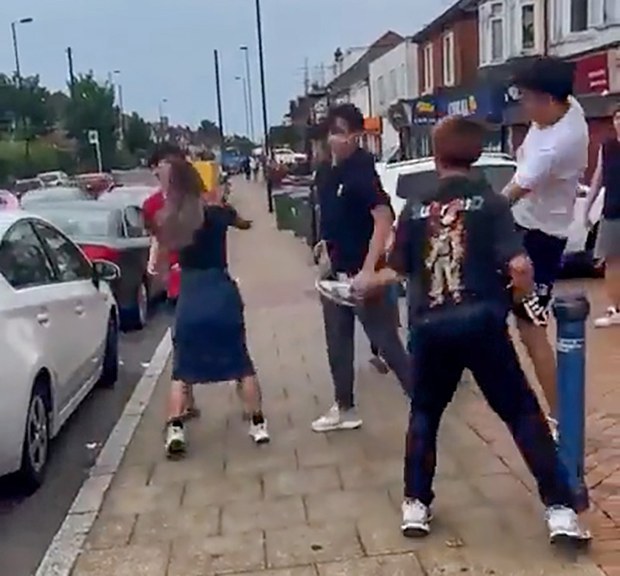Hong Kongers step up calls for UK sanctions despite climate of fear
Share

A man in a white shirt kicks at a man in a black shirt in this screenshot from a video taken in Southampton, England, Sunday, June 11, 2023. British police are investigating an attack on two Hong Kongers in the southern English city of Southampton.
Exiled Hong Kongers in the U.K. are stepping up calls for the British government to sanction officials linked to human rights violations in the city they once called home, despite apparent attempts at sabotage and the threat of violence by supporters of the Chinese Communist Party.
Posters have been appearing on university campuses across the country calling for sanctions amid an ongoing crackdown on peaceful dissent and political opposition under the Hong Kong National Security Law, amid a risk of violent attacks from supporters of Beijing.
Some 30-40 students at nine universities including Oxford, Cambridge, Edinburgh and University College London have signed up for a poster and leaflet campaign launched by the campaign group HKers United, the head of the organization told Radio Free Asia.
“There are a great many international students in the United Kingdom, and a lot of students come to the U.K. to study,” said the group’s leader, who gave only the name Rex.
“In some countries, for example, Sweden, or Poland, they may not have a clear understanding of what is happening in Hong Kong, and we want more people to pay attention to this. Then they can explain it to people back home.”
But Rex said the poster campaign has been marred – apparently by the actions of Beijing’s supporters on British soil.
“We put up the posters, and they disappeared the next day,” Rex said. “We all know that there are a lot of Chinese students on [British] campuses, and we highly suspect that it was them.”
“But we can’t let that stop us because it’s hard to avoid.”
The renewed campaign comes amid growing concerns over Chinese Communist Party infiltration of all aspects of British life, and warnings from Hong Kongers in exile over growing acts of violence by Beijing’s supporters and officials alike.
Overseas activists frequently report being targeted by agents and supporters of the Chinese state, including secret Chinese police stations in a number of countries.
Protecting culture and freedom
Meanwhile, a petition calling on the government to sanction officials and civil servants whose actions contribute to breaches of rights and freedoms that Beijing promised would remain after the 1997 handover had garnered more than 20,000 signatures when viewed on Monday.
“The U.K. has to take responsibility to monitor China’s implementation,” the petition read, citing the 1984 Sino-British Joint Declaration governing the handover to Chinese rule.
“We want the U.K. Government to implement sanctions to pressure the Chinese regime not to undermine the rules of law, democracy and autonomy of Hong Kong and protect the interests of the British in Hong Kong,” it said.
A Hong Kong student who gave only the nickname Water said people had been out on his campus in London on Monday, promoting the petition.
“Students … represent the opinions of the next generation of Hong Kongers,” Water said. “We are very worried right now about whether we can pass on Hong Kong’s culture and its freedoms can be passed on [to the next generation].”
“If our generation doesn’t do this, then there’s no guarantee that the next generation will,” he said.
He said older Hong Kongers sometimes express fear and concern for his generation of student activists, however.
Activists at risk
U.K.-based former pro-democracy lawmaker Dennis Kwok, who is among eight overseas activists wanted by Hong Kong’s national security police for allegedly “serious crimes” under the national security law, said he believes many more people are too scared of potential repercussions to join the campaign.
Calling for sanctions has been criminalized under the National Security Law, under clauses banning “collusion with foreign powers.”
National security police have hauled in family members of most of the eight wanted activists in recent weeks for questioning, in addition to placing a HK$1 million bounty on each of the activists’ heads.
“Our goal is to obtain 100,000 signatures to show the strength of public opinion … by Jan. 10 next year,” Kwok told Radio Free Asia. “We are hoping that the British government will use stronger diplomacy … to protect political dissidents and activists with British National Overseas passports or British nationality, including Jimmy Lai.”
Lai, a British citizen who founded the now-shuttered pro-democracy Apple Daily newspaper, faces two counts of “conspiracy to collude with foreign forces” and one count of “collusion with foreign forces” under a draconian security law imposed by Beijing in the wake of the 2019 protest movement, along with a charge relating to “seditious” publications.
He was first arrested in August 2020 and is currently serving time for fraud in connection with the lease on his Next Digital media empire’s headquarters.
The Foreign, Commonwealth and Development Office replied to the petition: “We keep all sanctions designations under close and regular review. We do not speculate about future sanctions designations, as to do so could reduce their impact.”
It said China is in “ongoing non-compliance” with the 1984 Joint Declaration, pointing to its suspension of the extradition treaty with Hong Kong, and the extension of an arms embargo on mainland China to Hong Kong.
Kwok dismissed the British government’s response to the petition as “insufficient.”
Translated by Luisetta Mudie.







